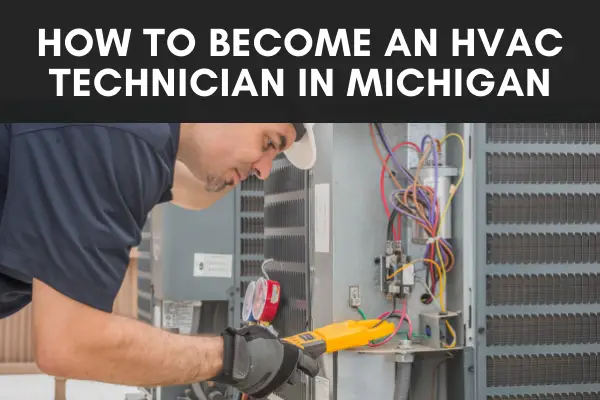There are well over 300,000 heating, ventilation, and air conditioning (HVAC) technicians in the U.S., with more than 8,200 found in Michigan. HVAC workers can start their careers through trade school programs or apprenticeships, eventually working as HVAC techs under licensed HVAC contractors. With enough experience and desire, techs can also work their way up to an HVAC license in MI, greatly expanding their earning potential.
Do You need an HVAC License in Michigan?
HVAC technicians in Michigan do not need to be licensed, but they should be supervised and work for a licensed HVAC contractor. Techs working with refrigeration systems (HVAC-R) should hold a Section 608 EPA Technical Certification.
HVAC contractors need a valid state license to operate.
Differences Between HVAC Techs and HVAC Contractors
When working in HVAC, you will begin as a student, trainee, or apprentice. Once you finish your program and have the necessary knowledge, you can begin working as an HVAC tech.
HVAC techs can install, remove, repair, and maintain different air quality systems. In Michigan, these techs are employed and supervised by a licensed HVAC contractor.
HVAC contractors can work independently or own their own HVAC business. They may or may not hire other techs or apprentices to work beneath them. In Michigan, HVAC contractors need to hold a Mechanical License (contractor license) from the Department of Licensing and Regulatory Affairs (LARA).
HVAC School and Apprenticeships
After completing high school, you may apply to an HVAC trade school or registered apprenticeship to become an HVAC technician.
HVAC trade school can last anywhere from 6 months to 2 years, although 2-year programs may be seen as more reputable and also lead you to an associate’s degree. These programs focus on theory and classroom hours, with many being offered at community colleges. Trade school programs are paid for by the student.
Registered apprenticeships may be more competitive to get, but that is because they focus on the hands-on HVAC tech experience. As an apprentice, you will complement classroom hours with paid work experience under a licensed HVAC contractor.
Some individuals may also become HVAC techs by receiving their associate’s or bachelor’s degree before entering the job force, although practical experience combined with education is usually preferred.
HVAC Tech Certificates
Most HVAC trade programs and apprenticeships will issue a certificate upon completion. These certificates can be used to prove your experience when entering the job market.
For HVAC techs planning on working with refrigerants, you’ll also need to get a Section 608 EPA Technical Certification. This certification is offered in four formats, depending on what type of equipment you plan to work on. Each format has a corresponding exam you must pass before receiving your certification, and these certifications never expire.
HVAC Mechanical (Contractor) License in MI
The Forbes Mechanical Contractors Act of 1984 requires that all installing and servicing contractors must be licensed to regulate the “use, installation, alteration and servicing or specified heating, cooling, ventilating, and refrigerating equipment and systems.”
Mechanical Licenses can be given with various classifications, such as:
- HVAC equipment
- Refrigeration
- Fire Suppression
- Limited refrigeration and air conditioning service
- Limited heating service
- Unlimited heating service
- Ductwork
- Hydronic heating and cooling and process piping
- Unlimited refrigeration and air conditioning service
- Specialty:
- Fuel Gas Piping
- Solid Fuel and Vented Decorative Gas Appliances
- LP Distribution Piping
- Solar Heating and Cooling
- Fuel Gas Piping and Venting
Contractors may receive multiple classifications under the same license, so long as they meet all of the requirements outlined below. HVAC contractors may want to be classified to work with HVAC equipment, limited heating service or unlimited heating service, and ductwork. HVAC-R contractors may also look into the refrigeration and limited/unlimited refrigeration classifications.
Mechanical License Requirements
To receive your Mechanical License, you’ll need to apply for the Mechanical Contractor Examination. You will also need to take an exam for each classification you want to have.
Requirements to apply for examination include:
- Be of good moral character
- Have 3 years or 6,000 hours of experience in the work and classification(s) you are seeking licensure in
There are also additional requirements for certain classifications.
- Ductwork classification: must already have the HVAC classification
- Limited heating service classification: must already have the HVAC classification
- Limited refrigeration & air conditioning classification: must already have the HVAC or refrigeration classification
- Unlimited heating service classification: must already have the HVAC or limited heating classification
- Unlimited refrigeration and air conditioning classification: must already have the HVAC, refrigeration, OR limited refrigeration & air conditioning classification
- Specialty classification: must already have the HVAC classification
Mechanical License Application Process
Once you meet the requirements, you can apply for your Mechanical Contractor Exam, including any classification exams you must take. You apply online or via mail.
When applying, be sure to:
- Complete the application in its entirety
- Include statements signed by each supervising contractor confirming the required work experience (statements should be provided for EACH classification)
- Pay all applicable fees
When your application is reviewed, you’ll be notified of the board’s decision. If approved, you will receive information on how to schedule your exam.
Mechanical Contractor Exam
Mechanical exams in Michigan are administered by PSI Exams.
Some classifications are given through open-book exams, while others are closed-book. See here for the details of each exam and which reference materials are recommended.
For details on scheduling and taking each exam, see the PSI Candidate Bulletin.
License Fees
- Mechanical License: $300
- Adding a classification in the first year of your license: $300 per classification
- Adding a classification in the second year of your license: $200 per classification
- Adding a classification in the third year of your license: $100 per classification
- Exam fee: all classification exams are $50, except for the HVAC classification which is $100
HVAC Salaries in Michigan
The more training, experience, and licenses you hold, the higher your potential salary as an HVAC tech or contractor. In Michigan, techs can expect to make an average of $47,580 per year plus overtime, while contractors enjoy an average of $80,000.

